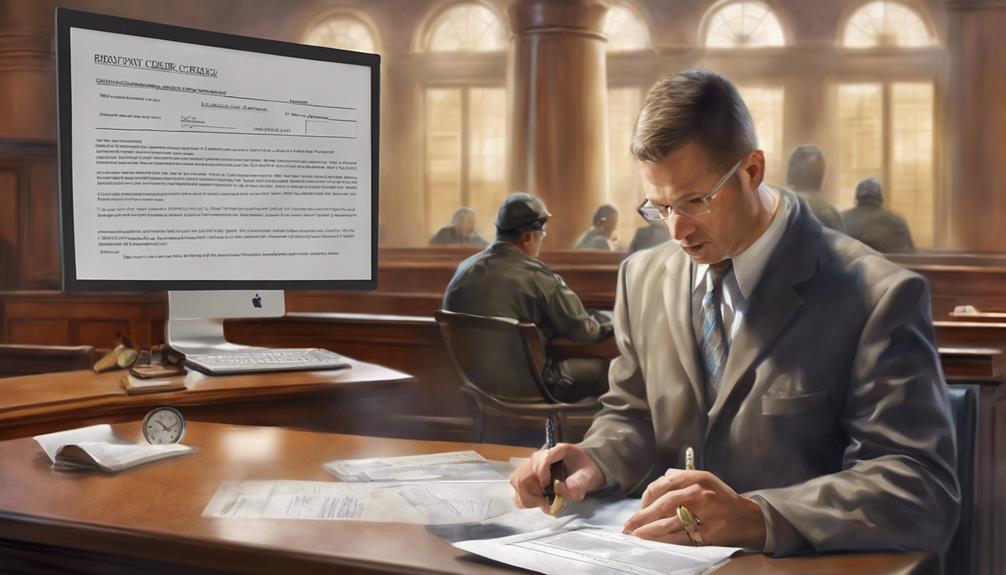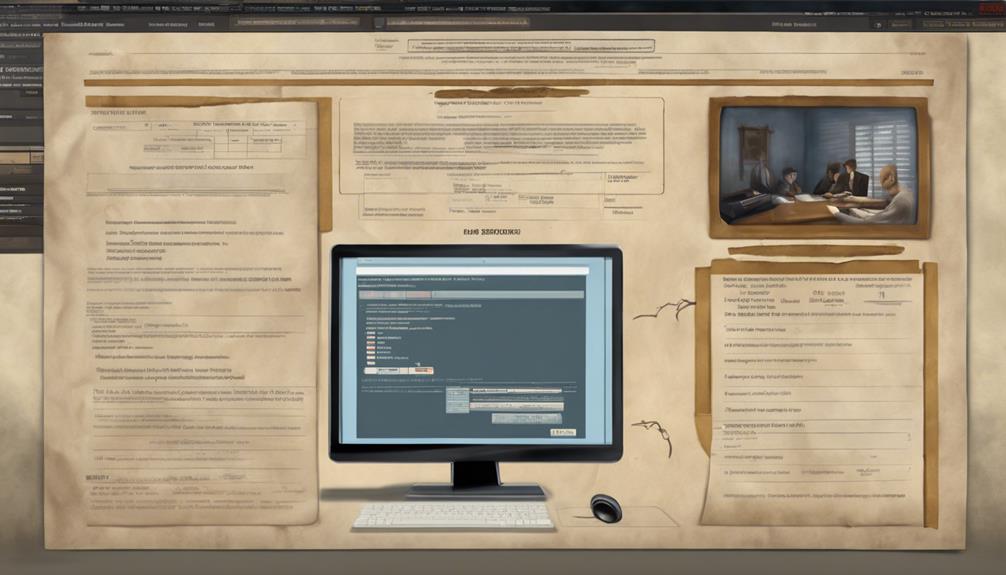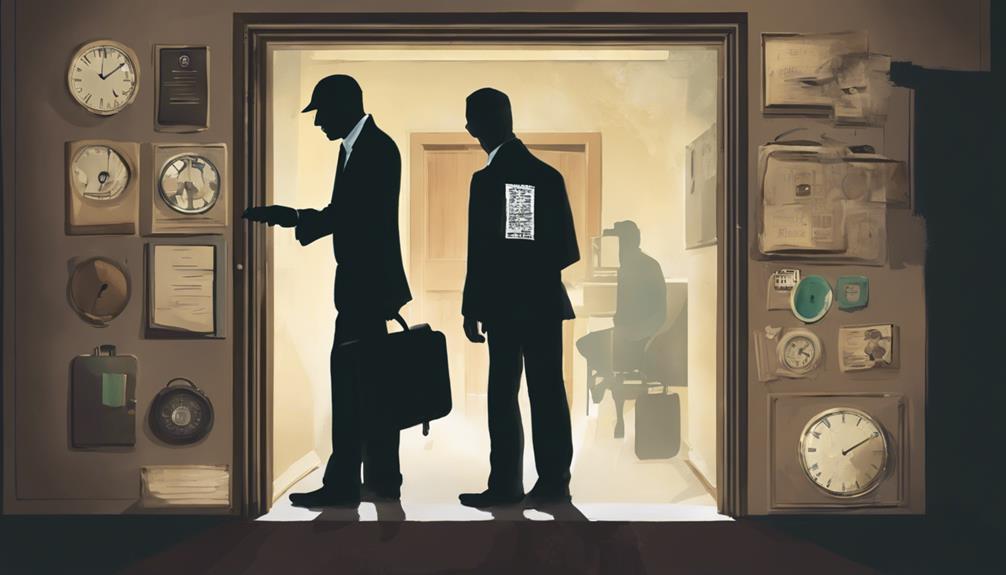Yes, restraining orders, temporary or permanent, can appear on background checks, affecting interactions with law enforcement and job opportunities. Being aware of their presence is important for individuals.
Key Takeaways
- Temporary and permanent restraining orders can appear on background checks.
- Expired orders might still be visible on detailed checks.
- Law enforcement databases retain records of restraining orders.
- Violating a restraining order can lead to criminal charges showing up on checks.
- Understanding the legal implications on background checks is crucial.
Types of Restraining Orders

Restraining orders come in various types, each serving distinct purposes in providing legal protection. Temporary restraining orders (TROs) are issued swiftly to offer immediate protection in situations like domestic violence cases. These orders typically last for about 14 days and can be extended based on court decisions.
On the other hand, permanent restraining orders provide longer-term safeguards, usually lasting 3-5 years despite the term 'permanent'. They're meant to offer continued protection against harassment, stalking, assault, or threats.
In cases of background checks, both temporary and permanent restraining orders can show up in criminal background checks and court records. However, once an order expires, it may not be visible on standard background checks.
It's essential for individuals involved in such situations to understand the implications of these orders on their legal records and take necessary steps to address any expired orders that might still be affecting them.
Visibility on Background Checks
Law enforcement databases can make temporary restraining orders visible during their active period, potentially impacting interactions with law enforcement and legal matters.
Even when expired, these orders might still show up on detailed background checks, affecting the restrained individual's employment opportunities.
The presence of a restraining order can have lasting consequences on a person's record and visibility in official databases.
Background Check Visibility
During routine checks or traffic stops, individuals with restraining orders may have the details of those orders accessible to law enforcement. Temporary restraining orders will appear in law enforcement's database while active, allowing officers to be aware of the restrictions placed on the individuals involved.
Permanent restraining orders become a part of the restrained individual's criminal record, potentially impacting future interactions with the law. The visibility of a restraining order on criminal background checks varies depending on the type of check conducted and the depth of information provided. Even expired restraining orders might still be visible on detailed background checks, underscoring the importance of understanding the implications of such legal actions.
It's essential for individuals to be aware that the presence of a restraining order, whether temporary or permanent, can have lasting effects on their criminal record and interactions with law enforcement.
Impact on Employment
Employers conducting thorough background checks may frequently uncover past or expired restraining orders, potentially impacting an individual's employment prospects.
When a restraining order is violated, leading to criminal charges, this information can show up on detailed background checks, particularly for roles that involve sensitive responsibilities.
Law enforcement databases retain records of both active and past restraining orders, increasing the visibility of such incidents during background screenings.
For job seekers, understanding the potential presence of restraining orders on background checks is critical, as it can influence their chances of securing employment, especially in positions where trust and adherence to the law are paramount.
Even if a restraining order has been expunged or no longer in effect, it may still appear on certain background checks, potentially raising concerns for prospective employers regarding court-ordered protection and past interactions with the legal system.
Impact on Employment

Having a restraining order on one's record can greatly influence the outcome of job applications that involve background checks. Employers often conduct thorough background checks that include civil court records, where restraining orders can show up. This visibility may lead to employers considering the presence of a restraining order when making hiring decisions, especially for roles involving sensitive populations. In some states, there may be a legal requirement for individuals to disclose the existence of a restraining order during the hiring process. Therefore, it is advisable for individuals with restraining orders to seek legal advice on how to address this matter when applying for jobs. Being prepared to discuss the circumstances surrounding the restraining order with potential employers can help navigate any concerns that may arise during the hiring process.
| Aspect | Impact | Importance |
|---|---|---|
| Employment | Restrict job opportunities | High |
| Legal Compliance | Disclosure requirements | Medium |
| Hiring Decisions | Consideration for certain roles | High |
| Background Check | Inclusion of civil court records | High |
| Legal Assistance | Seeking advice for addressing the issue | Medium |
Violation Consequences
The consequences of violating a restraining order can result in criminal charges, hefty fines, and potential imprisonment for up to two years. When individuals violate a restraining order, they may face legal consequences such as contempt of court charges and additional penalties.
The severity of penalties for violating a restraining order can vary depending on factors like prior violations, a history of domestic violence, and the extent of the breach. Courts may impose harsher penalties on individuals with a domestic violence history or a pattern of non-compliance with the terms of the restraining order.
It's vital for individuals to adhere to the terms of the restraining order to avoid facing criminal charges and harsh consequences. By complying with the restraining order, individuals can mitigate the impact on their daily lives and reduce the risk of legal repercussions.
It's essential to understand the penalties for violating a restraining order to make informed decisions and prevent further legal issues.
Legal and Ethical Considerations

Employers must carefully navigate the legal implications of restraining orders in background checks, ensuring compliance with regulations like the Fair Credit Reporting Act.
Ethical hiring considerations come into play when determining the relevance of a restraining order to a specific job role and its associated risks.
Balancing these legal and ethical aspects is essential to avoid discrimination and make informed hiring decisions based on the information obtained.
Legal Implications of Orders
What legal and ethical considerations arise when evaluating the impact of restraining orders on background checks?
Employers face a multitude of factors to weigh when dealing with restraining orders in the field of employment and workplace dynamics. Here are some key points to ponder:
- Legal Implications: Understanding the distinction between criminal law and civil matters related to restraining orders is essential in determining their relevance to background checks.
- Fair Hiring Laws: Employers must ensure compliance with equitable hiring laws to avoid discrimination based on the presence of a restraining order.
- Court Hearing: The outcome of a court hearing related to the restraining order can greatly impact its validity and relevance in a background check.
- Ethical Considerations: Employers should navigate the ethical implications of using information about restraining orders, balancing the need for a safe workplace with the rights of the individual involved.
Ethical Hiring Considerations
Managing ethical hiring considerations surrounding restraining orders involves balancing legal compliance with fair and equitable practices. When conducting background checks, employers must be cautious not to engage in discriminatory practices while seeking information about restraining orders.
It's within a company's discretion to determine how a restraining order may impact an individual's employment, all the while upholding fair employment practices. To avoid potential legal issues, employers should navigate the hiring of individuals with restraining orders carefully.
When accessing court order records for making hiring decisions, it's vital for employers to comply with the Fair Credit Reporting Acts. Understanding the legal and ethical implications of considering restraining orders in employment is essential for maintaining a workplace that's both fair and safe for all employees.
Protective Orders Overview
Protective orders, issued in cases of domestic violence, abuse, or harassment, serve to safeguard victims from further harm. These legal documents are essential in providing protection to individuals facing threatening situations. Here are some key points to understand about protective orders:
- Associated Cases: Protective orders are typically linked to criminal cases involving violence or abuse.
- Restrictions: They often come with limitations on contact or proximity to guarantee the safety of the victim.
- Law Enforcement: Authorities such as the police are responsible for enforcing protective orders.
- Impact: Protective orders can affect various aspects of a victim's life, including child custody arrangements and living situations.
These orders play a significant role in providing legal safeguards for victims in vulnerable situations. Proof of abuse or violence is usually required for the court to grant a protective order, emphasizing the need for evidence to guarantee the victim's safety.
Obtaining and Consequences

Obtaining a restraining order involves filing a formal request with the court outlining the reasons for seeking legal protection. While restraining orders may not always appear on general background checks, they can show up in detailed criminal background checks or specific searches of court records.
Violating a restraining order can result in serious consequences, including criminal charges, fines, and potential imprisonment, impacting one's legal record and future opportunities. Law enforcement has access to information regarding active and past restraining orders, which can influence interactions and legal proceedings.
Renewal of restraining orders is possible before expiration, and successful completion without violations may lead to expungement from one's record. Understanding the legal consequences of violating restraining orders is vital, as they can have lasting effects on one's life.
It's important for individuals to be aware of the implications of restraining orders and to comply with the terms to avoid legal repercussions.
Legal Assistance and Employment
When dealing with restraining orders, seeking legal assistance becomes important, especially concerning its potential impact on employment. Legal guidance is essential to navigate the complexities of restraining orders and how they may appear on background checks.
Here are key points to keep in mind:
- Hire an attorney: Engaging a lawyer to contest the order can be advantageous, as they can provide expertise in the legal process.
- Understand the implications: Being aware of how restraining orders can show up on in-depth criminal background checks is essential for job seekers.
- Expunging restraining orders: Exploring the possibility of having the restraining order expunged can help reduce its effects on future employment prospects.
- Temporary restraining orders: Knowing the distinction between temporary and permanent restraining orders is important when evaluating their impact on job applications.
Frequently Asked Questions
Can You Expunge a Restraining Order in California?
In California, individuals can expunge a restraining order by requesting a dismissal from the court after it expires. The process involves filing a petition. Expunging a restraining order can help remove it from background check results.
Can You Get a Job With a Restraining Order in California?
Sure, having a restraining order in California might make landing a job trickier. Employers can know about it through background checks. Job seekers should be aware of the potential impact and be prepared to address any concerns.
Does a Restraining Order Show up on a Background Check in Texas?
In Texas, restraining orders may not appear on general background checks. However, detailed searches or specific criminal background checks can uncover them. Employers can access up to 7 years of an individual's criminal history, revealing restraining orders.
Do Restraining Orders Show up on Background Checks in Florida?
In Florida, detailed background checks may reveal active or expired restraining orders, while standard checks might not include this information. Employers could access court records with applicant consent, and violating orders can result in legal repercussions.
Conclusion
To sum up, restraining orders can have serious implications on background checks, employment opportunities, and legal consequences for violations.
It's important to seek legal assistance and understand the ethical considerations surrounding protective orders.
Remember, a restraining order isn't just a piece of paper; it can be a shield of protection or a sword of consequences.
Stay informed and proactive in maneuvering the complexities of restraining orders.









